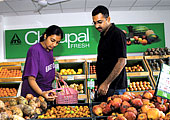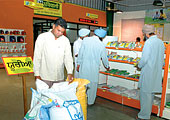|
Agriculture's
Second Wind
It has never been an easy relationship between
corporate India and farmers. Yet, as emerging retail chains scour
rural India to replenish their store shelves, this is poised to
change.
By Shalini S. Dagar
 |
| It takes savvy to survive:
Aulakh has been associated with Pepsi for seven years
and wants to grow exotic vegetables now |
Sukhjit
Singh Aulakh, 43, is no mascot for Indian agriculture plodding
along at 1 or 2 per cent growth rates or even for despair and
debt-laden farmers driven to suicide. A prosperous farmer in Jalowal
area of Punjab, Aulakh has around 50 acres of land under his production-partially
his own land and the rest leased from others. Apart from staples
wheat and paddy, he has grown potatoes, chillies, tomatoes and
groundnuts in the past. He is now mulling growing baby corn and
exotic vegetables on his fields. "In the coming season, I
am planning a trial of baby corn on half an acre," he says
softly.
How does he manage to stay ahead of the curve?
Well, for one he is well educated and a confident risk taker.
For another, he has been associated with PepsiCo for the last
seven years. The association spans the entire gamut of functions-sourcing
planting material and taking cropping advice from agronomists
and sometimes even selling the produce to the company.
| The entry of private
companies will result in greater investment in farm technology |
In a nearby district at Ladowal, close to
Ludhiana, Bharti Enterprises' joint venture with Rothschild, FieldFresh,
is assiduously growing exotic vegetables such as cherry tomatoes,
bell peppers, snow peas and sugar snap peas on a 300-acre farm
leased from Punjab Agricultural University. The baby corn trials
that farmer Aulakh is contemplating are driven by this FieldFresh
farm. Bharti is trying to leverage the relationships that Pepsi
has built with farmers over the past 17-odd years of its presence
in India to set up a captive base for the agri-produce it needs.
Elsewhere, Reliance Retail is said to be
bringing state-of-the-art technology to potato cultivation. Although
the retailer is tight-lipped about it, people in the know say
that it intends to take contract farming to another level by not
just helping negotiate better seed prices for its farmers, but
also improving farm productivity through nifty strategies such
as growing tubers in nurseries and transplanting them to the farms
to cut crop cycle time. On an average, it takes about 90 days
for the potato to reach a stage where it can be harvested. By
growing tubers in nursery, Reliance can cut down the amount of
time the crop needs in the farm.
 |
| Fruits of enterprise:
Bharti's Mittal is partnering with farmers to export produce |
Indian farmers can do with such help. Although
nearly 700 million Indians depend on agriculture for their livelihoods,
the sector accounts for just 20 per cent of the GDP and has been
struggling to grow consistently. In fact, agriculture's patchy
growth is one reason why the Indian economy hasn't been able to
breast the 10 per cent mark. Why is the sector a laggard? The
reasons are well known. They range from fragmented holdings to
poor irrigation and a complete absence of modern supply chain
to antiquated regulations. Therefore, although India is among
the world's largest producers of foodgrain, fruits and vegetables,
it is also among the most inefficient. An estimated 25-40 per
cent of farm produce worth $12 billion (Rs 50,400 crore) rots
every year even before it reaches consumers, thereby squeezing
both ends of the chain-namely, the farmer and the retail consumer.
Farmer's New Friends
All that may soon change. A handful of companies
is positioning itself along different parts of the farm-to-fork
supply chain. Those include new retailers such as Reliance Retail
and Bharti (FieldFresh) and produce exporters' such as Gautam
Thapar's Global Green Company and Mahindra & Mahindra (Mahindra
Shubhlabh), and consolidators such as DCM Shriram (Hariyali) (see
India Inc. on the Farm). The entry of private companies will lead
to two things that will enhance value in the sector. One, it will
result in greater investment in farm technology, be it in the
form of better seeds and irrigation techniques or crop care. Two,
and this is perhaps more important, it will aggregate demand,
thereby allowing direct sourcing from farmers. With corporate
buyers around, farmers may be better able to raise loans from
banks to invest in farm equipment, seeds and fertiliser.
Take PepsiCo, for example. At Jalowal, the
American company has in a joint venture with the Punjab government
set up the world's largest citrus nursery with an annual capacity
of 4 million plants. At the facility, hardy varieties of citrus
plants (root stock), which are already acclimatised to the Indian
weather conditions, are injected with stubs of exotic plants (known
as bud wood) such as tangerine and mandarin oranges to get saplings
that are ready to be planted in open fields of the farmers. The
process, which takes around 18 months, is partially done in glass
houses and net houses, especially at the earlier stages of growth.
 |
| Looks good: ITC's
Choupal Fresh focuses both on retail and procurement |
The planting material is given to the farmers
for free. And in order to support the farmer for the initial three-four
years when there is no fruit, there is a rental income. The farmer
contributes through his land and his effort. Subsequently, when
the plant bears fruit, the citrus JV and the farmer split the
profits. The initial batch of saplings from the nursery has yet
to be planted. With the help of the Punjab government, the Citrus
Council has managed to bring in 6,000 acres under citrus cultivation
in the last few months. Pepsi intends to use the produce from
this region as a sourcing base for Tropicana juices for the entire
Asia-Pacific region.
An equally big benefit to farmers is the
resulting disintermediation. "Disintermediation itself can
be a business model," says Abhiram Seth, Executive Director,
PepsiCo India Holdings. Typically, the retail price of farm products,
say, melons in summer, can be marked up several multiples the
farm gate prices due to the presence of various levels of intermediaries.
"There is usually at least a 10-15 per cent increase in retail
prices due to intermediation," says Arvind Choudhary, CEO,
Food Business, Pantaloon Retail. Pantaloon, of course, has a mix
of sourcing options ranging from accessing produce directly from
the farmers to the relying on other aggregators such as Adani
AgriFresh, ITC's e-choupal and DCM's Hariyali. "The loading
of margins at each level would still be acceptable if there is
some value addition at these intermediate stages, but there is
none," points out Dipankar S. Halder, CEO, Spinach, Wadhawan
Food Retail.
An older player in the sector is Mahindra
Shubhlabh Services, a subsidiary of Mahindra & Mahindra. It
eschews any sort of retail ambitions, both on the urban and rural
side, and intends to provide farm-related services and procure
from farmers. "We intend to remain at the back-end of the
supply chain with a firm rural focus," says Vikram Puri,
CEO, Mahindra Shubhlabh Services. The famed ITC model of 'choupals',
however, has a strong retail angle despite its primary focus on
procurement. Not only does it provide the company a platform to
push its own FMCG products, but it is also able to offer complementary
end-to-end services through amenities such as petrol pumps and
bank ATMs.
 |
| Ready to retail: Baby
corn from Bharti's FieldFresh |
DCM Hariyali, part of the Shriram Group, though
not a substantial direct consumer of farm produce itself, is also
banking on an ITC-like model to position itself as a farm aggregator
for emerging retail chains as well as a delivery platform for
companies wanting to offer goods and services to rural farm and
non-farm consumers. "Our model is to provide to rural India
the right inputs at the right time, right place, and the right
cost," says Ajay S. Shriram, Chairman and Senior Managing
Director, DCM Shriram Consolidated.
Most players have models that overlap in
parts. However, in a bid to ensure loyalty of the farmers almost
all the corporates are engaging in what is technically known as
"extension services". This ranges from information about
weather, soil and water conditions, seeds, and pests. Most of
these rural centres have agronomists who advice the farmer on
these issues. Finance Minister P. Chidambaram had also flagged
off the significance of extension services in his Budget Speech
for 2007-08.
Though the advice may be somewhat simplistic,
it is often critical in terms of better crop practices. Chandrashekhar
K. Vaidya, MD, Godrej Agrovet, part of the Godrej Group, recounts
how sub-optimal agricultural practices were leading to low yields
(25-30 tonnes an acre) for the sugarcane farmers in Maharashtra
when even 100 tonnes an acre was possible. "Based on the
advice given and limited changes made by the farmers given their
economic conditions, the yields improved by 8-15 tonnes an acre,"
he says.
Increased investment by the private sector,
whether in building actual physical infrastructure or in providing
goods and services, can only augur well for the farm sector. Over
the last many years, as pointed out by M.S. Swaminathan-chaired
National Commission on Farmers, agriculture has remained an area
of under-investment. However, traditionally the farm sector has
not been an easy area for companies to operate in. "It is
a matter of centuries of mistrust. The problem runs too deep...
the divide between Bharat and India, and it takes time to build
trust," says Godrej Agrovet's Vaidya.
Uneasy Co-existence
 "The
private companies won't deal with more than 5 per cent of farmers-mainly
the large farmers. What about the 70 per cent of the small and
marginal farmers? In any case there is no level playing field
between small farmers and big companies," says Swaminathan,
father of India's Green Revolution, articulating the farmers'
fears. The mistrust has been heightened by some failures in contract
farming agreements in recent years. Farmers at Kotkapura in Punjab
point out that basmati rice companies reneged on their contracts
with pre-fixed prices of Rs 1,300 per tonne a few years ago when
the prices in the open market went down to Rs 1,100 per tonne.
"They picked up nothing," complain the farmers. "The
private companies won't deal with more than 5 per cent of farmers-mainly
the large farmers. What about the 70 per cent of the small and
marginal farmers? In any case there is no level playing field
between small farmers and big companies," says Swaminathan,
father of India's Green Revolution, articulating the farmers'
fears. The mistrust has been heightened by some failures in contract
farming agreements in recent years. Farmers at Kotkapura in Punjab
point out that basmati rice companies reneged on their contracts
with pre-fixed prices of Rs 1,300 per tonne a few years ago when
the prices in the open market went down to Rs 1,100 per tonne.
"They picked up nothing," complain the farmers.
Industry officials privately agree that there
have been slippages on the corporate front, and not just on the
part of the basmati companies. However, the farmers too have been
guilty of selling part of their produce in open markets when prices
go up or of bringing their neighbours' and relatives' produce
as their own when the prevailing market prices are low.
However, then in many cases, "the contract
has been used for the wrong commodity," reckons S. Sivakumar,
Chief Executive (Agri-business Division), ITC. "For a contract
to be successful there has to be a reciprocal dependency between
the farmer and the buyer," he says. This dependency could
be due to perishability or geography considerations. For instance,
sugarcane farmers and factories share this symbiotic relationship.
Or it is a very specific type of production
that requires the farmer to follow specific protocols. Global
Green, with its emphasis on gherkins, is a case in point. G.V.G.
Rao, Vice President (Agri-operations), Global Green, says: "Contract
farming works well for gherkins since there is no local demand
for the product." Last year, the company crossed Rs 100 crore
in revenues and following the acquisition of Belgium-based Intergarden
Group, its topline has crossed $100 million. However, ITC's Sivakumar
says there are ways around the problem. "Rather than a pre-fixed,
non-market linked price, there could be price referenced to the
market. Also the fixed price could be only for a part of the harvest."
 |
| A mixed bag: DCM's
Hariyali aims to be a farm aggregrator |
What about the Small Farmer?
Some of these issues get accentuated where
small and marginal farmers are concerned, as they have limited
investment capabilities and low cushions against loss. So, is
the small farmer on his way out? Certainly not, say most people
involved in agriculture. Horticulture, which is people-intensive,
is certainly an option for marginal farmers. "Farm incomes
rise by as much as 30-40 per cent by growing fruits and vegetables
as against traditional crops of wheat and rice," says Rakesh
Bharti Mittal, Vice Chairman, Bharti Enterprises. Also there are
some advantages that are typically the small farmer's. For example,
in case of harvesting, the small farmer probably does it with
his family, whereas the large farmer will pay labour.
An additional model that could well evolve
and that probably needs a lot more cultural education is that
of the leased farms. The small farmer could well derive his income
from lease rentals to large corporates or from large farmers and
an additional farming wage component. However, this would also
need counter-balancing checks which ensure that the system is
not abused. Yet another could be the rise of farm cooperatives.
Experts aren't too worried about the small
farmer's fate. "The Indian farmer is quite competitive. For
him to compete effectively in a liberalised foreign or domestic
arena, he needs to be free of the outside costs that currently
hobble his performance," says World Bank's lead economist
Aaditya Mattoo, pointing out that it is cheaper to get apples
from Australia to Tamil Nadu than it is to transport them from
Himachal Pradesh. The corporate sector can certainly help in driving
such efficiencies. However, the efforts till date by the private
sector, though laudable at best, scratch the surface. An enabling
regulatory regime is one of the key requirements. "Going
forward, corporate farming will be the key to the second green
or the evergreen revolution," says Bharti's Mittal. The farmers
are waiting.
-additional reporting by Kapil Bajaj
|









 "The
private companies won't deal with more than 5 per cent of farmers-mainly
the large farmers. What about the 70 per cent of the small and
marginal farmers? In any case there is no level playing field
between small farmers and big companies," says Swaminathan,
father of India's Green Revolution, articulating the farmers'
fears. The mistrust has been heightened by some failures in contract
farming agreements in recent years. Farmers at Kotkapura in Punjab
point out that basmati rice companies reneged on their contracts
with pre-fixed prices of Rs 1,300 per tonne a few years ago when
the prices in the open market went down to Rs 1,100 per tonne.
"They picked up nothing," complain the farmers.
"The
private companies won't deal with more than 5 per cent of farmers-mainly
the large farmers. What about the 70 per cent of the small and
marginal farmers? In any case there is no level playing field
between small farmers and big companies," says Swaminathan,
father of India's Green Revolution, articulating the farmers'
fears. The mistrust has been heightened by some failures in contract
farming agreements in recent years. Farmers at Kotkapura in Punjab
point out that basmati rice companies reneged on their contracts
with pre-fixed prices of Rs 1,300 per tonne a few years ago when
the prices in the open market went down to Rs 1,100 per tonne.
"They picked up nothing," complain the farmers.